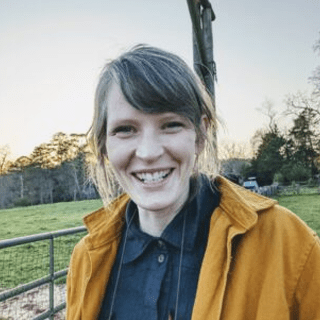
February 1, 2023
Meet the Educopians: Jessica Meyerson
By Kelly PendergrastIn October 2022, Educopia moved to a new collaborative leadership model. Jessica Meyerson took on the role of Co-Executive Director along with Katherine Kim and Racquel Asante. Jessica’s focus as Co-Director is on organizational development and community cultivation.
Below, Jessica reflects on the new co-leadership model, how it’s going so far, and what she is excited about for the future of Educopia.
What are your goals and priorities for the shared leadership model and Educopia going forward?
I see the shared executive leadership model as one of several strategies that Educopia is advancing in order to both honor and strengthen organizational foundations established by our former ED, Katherine Skinner, and our founding/past Board members, and to reflect the evolving vision of the current Board and Staff. It sits alongside our exploration of distributed decision making models (Thank you, Roshni from RVC!) and our commitment to operationalize shared leadership beyond executive leadership.
This points to the second part of the question: goals for Educopia going forward. Here again we are building on our core organizational foundations and our shared mission, but evolving the way we approach our work to reflect changes in the constellation of people/perspectives/gifts that comprise Educopia and its partners; changes and opportunities in the broader information landscape; and the evolution of our vision for change. Educopia wants to help drive a fundamental shift in how people from different positionalities in the information landscape perceive power sharing and distributed leadership within collective action efforts. We want individual Educopia staff to continue contributing to areas of information management, and to expand our contributions to the broader community development and collective action discourse including and beyond the information field. I want Educopia to demonstrate the ways in which a relational framework for understanding power, work, infrastructure, and well-being is not idealistic or nice-to-have — it is in fact critical to the future of our field.
Can you reflect on the process of moving to a shared leadership model?
I’ve been with Educopia since 2017. When I moved into a Director role at Educopia in 2019, there were several compelling examples of organizations that had made the transition from a founder/ED model to shared executive leadership models, well-documented via Nonprofit Quarterly webinars and organizational blogs. However, there were several conditions for successful implementation of a shared leadership model that were not in place at Educopia at the time. Most notably, these were: 1) explicitly distinct but interdependent leadership functions (that everyone, staff and Board alike, understand as such); 2) shared vocabulary for explicitly analyzing/naming alignment or misalignment between organizational policies and practices and our organizational equity commitment; and 3) a set of explicit, shared practices to advance our organizational equity commitments. Intentional work on behalf of all members of the Educopia team to create the conditions for shared leadership started in 2019 as a result of earlier reflections. A series of changes externally and internally over the past four years was required to get to this particular organizational moment for Educopia, including close work with our Board over the last year. We are (and always will be) a work in progress – committed to continuous learning and improvement.
How does your previous work inform your work as a Co-Director at Educopia?
These days, I describe myself as an organizational steward, professional facilitator, community cultivator, and applied researcher – but in the first phase of my professional life I worked as an archivist and information manager at the University of Texas at Austin. I worked with and across all departments of the university to build and maintain infrastructures to support knowledge production, dissemination, and long-term access. I still identify very closely with my information science background, and the work that I was engaged in at the university has helped to shape how I think about the work I do now.
With my work at Educopia Institute, my throughline is the same: how information flows between people over time, the varying ways that groups produce knowledge together, and what both of these things can teach us about the relationships between people, organizations, and systems.
What keeps you energized?
I love this question! I am energized by partnering with and supporting others (teams, groups, communities, organizations, individuals) in the design of processes that translate their insights and ideas to action and impact; and the complementary work of maintaining alignment over time between the ideas and values that inspire collective action, and the distributed actions of the individuals involved. I am energized by creating conditions for others to surface and reflect on their deeply rooted assumptions; to trust and cultivate their self-knowledge; and to apply their relational wisdom (ways of being with others that honor our full and complex humanity). I am energized by mapping connections between ideas that are seemingly unrelated (e.g. relating concepts in science/speculative fiction to organizational development). I am energized by the experience of shared learning, or learning in community — where each person participating is both giving and receiving, deepening their appreciation of difference (in positionality and perspective), and collectively the group is building power as a result of building shared understanding.